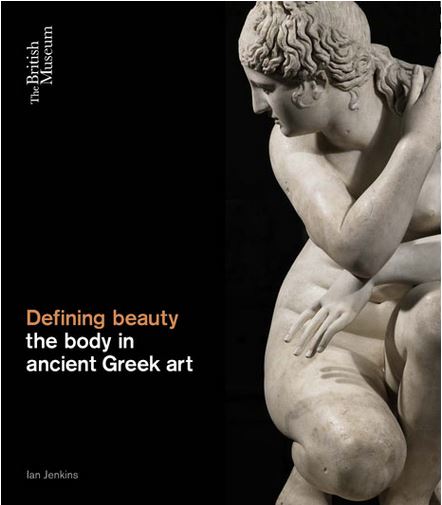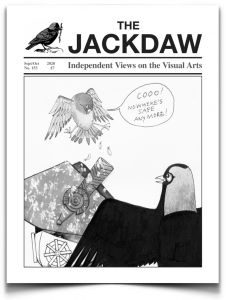 In all the doting coverage of ‘Defining Beauty: The Body in Ancient Greek Art’ at the British Museum, no mention was made of the fact that the bulk of major exhibits featured were from the museum’s own collection. Stupidly, I had believed – and perhaps was even misled by advance publicity – that the exhibition would feature a range of major sculptures I hadn’t seen before. I should have known better. During the months before the display opened, regular visitors would have noticed a weekly disappearance of prize pieces from the Greek and Roman galleries. Indeed, for two months in advance of the show half the Duveen gallery exhibiting Parthenon material was crudely boarded off like a building site. Art critics, many of whom nowadays are at sea dealing with anything made before last weekend, were bowled middle stump by Defining Art. They didn’t know the BM sufficiently well to realise that many works for which they were recommending the public pay handsomely could have been seen free any time in the preceding 262 years and will be free again after July 5th when the spectacle closes. It serves the museum right that attendance for what was doubtless planned as a cash-cow blockbuster hasn’t risen above a trickle. A sad irony is that works are better appreciated in the deserted exhibition than they are normally when enveloped by noisy swarms of disaffected foreigners shuffling along with scarcely a glance at anything deemed unworthy of a selfie. It goes without saying that the more important works illustrated in the accompanying book (which isn’t a catalogue), indeed the crucial ones to the show’s thesis, were not included in the exhibition: they live in Greece, a country with whom regrettably we have no dealings.
In all the doting coverage of ‘Defining Beauty: The Body in Ancient Greek Art’ at the British Museum, no mention was made of the fact that the bulk of major exhibits featured were from the museum’s own collection. Stupidly, I had believed – and perhaps was even misled by advance publicity – that the exhibition would feature a range of major sculptures I hadn’t seen before. I should have known better. During the months before the display opened, regular visitors would have noticed a weekly disappearance of prize pieces from the Greek and Roman galleries. Indeed, for two months in advance of the show half the Duveen gallery exhibiting Parthenon material was crudely boarded off like a building site. Art critics, many of whom nowadays are at sea dealing with anything made before last weekend, were bowled middle stump by Defining Art. They didn’t know the BM sufficiently well to realise that many works for which they were recommending the public pay handsomely could have been seen free any time in the preceding 262 years and will be free again after July 5th when the spectacle closes. It serves the museum right that attendance for what was doubtless planned as a cash-cow blockbuster hasn’t risen above a trickle. A sad irony is that works are better appreciated in the deserted exhibition than they are normally when enveloped by noisy swarms of disaffected foreigners shuffling along with scarcely a glance at anything deemed unworthy of a selfie. It goes without saying that the more important works illustrated in the accompanying book (which isn’t a catalogue), indeed the crucial ones to the show’s thesis, were not included in the exhibition: they live in Greece, a country with whom regrettably we have no dealings.
We’ve become inured to the scam operated by many museums whereby they demand payment for what should be gratis. And the Department of Culture, the House of Commons’ Select Committee, and assorted museum trustees, all otherwise so proudly defensive of our free museums, let them get away with it. However, Defining Beauty set new standards in such fraud. With the exception of a rare bronze of middling quality recently trawled from the Adriatic off Croatia, the influential Belvedere torso from the Vatican and a few oddments, I emerged feeling well and truly robbed of £16.50.
In previous issues I’ve criticised the BM for misrepresenting the experience of a visit there. We’ve been told often, mainly by the Director, that the museum tells a definitive story of classical sculpture and civilisation and shouldn’t be tampered with – this is their Elgin Marbles Sicilian defence. The collection is too patchy to attempt any such thing. And even if it were not, all the galleries are not open at the same time anyway. Visitors are never allowed to see the full story. Recently, I was ejected from two rooms in quick succession as they were closing only minutes after opening. They claim shortage of cash but in the last 15 years the BM has spent hundreds of millions on two major building projects, one of which is a shopping mall with a vile swimming pool roof. Constant closures ensure that many of the more fascinating pieces are off bounds every day. On my most recent visit galleries housing the Bassae frieze and the Mausoleum of Halicarnassus were, as usual, shut. But at least the wondrous, blissfully empty architecture galleries, in my experience closed for years, were open – a red letter day indeed.
As I write, news arrives that the BM has leased for five years 500 works to a Qatari museum for an undisclosed fee. Depletions to galleries of the sort mentioned above will, it seems, become a permanent fixture as the museum realises its main financial asset is the quality of collections they can pimp to the highest bidder (which, conveniently, fucks Greece). Am I the only one who thinks renting masterpieces in bulk to the Middle East is just a tad risky?
We are entering a different age to that post-war world of museums where I discovered escape, solitude, inspiration and willing expertise on tap. Museums no longer principally exist to benefit those dedicated to what they preserve. I regret this loss of innocence and its replacement by venal opportunism. At the same time, I’m grateful to have experienced the best of it while it lasted.
David Lee
July/August 2015


